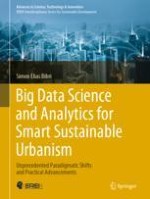Abstract
As a new area of science and technology (S&T), big data science and analytics embodies an unprecedentedly transformative power—manifested not only in the form of revolutionizing science and transforming knowledge, but also in advancing social practices, producing new discourses, catalyzing major shifts, and fostering societal transitions. Of particular relevance, it is instigating a massive change in the way both smart cities and sustainable cities are studied and understood, and in how they are planned, designed, operated, managed, and governed in the face of urbanization. This relates to what has been dubbed data-driven smart sustainable urbanism, an emerging approach which is based on a computational understanding of city systems that reduces urban life to logical and algorithmic rules and procedures and that employs new scientific methods and principles, while also harnessing urban big data to provide a more holistic and integrated view or synoptic intelligence of the city. This is underpinned by epistemological realism and instrumental rationality, which sustain and are shaped by urban science. However, all knowledge is socially constructed and historically situated, so too are research methods and applied research as related to S&T and as historically produced social formations and practices that circumscribe and produce culturally specific forms of knowledge and reality. This chapter examines the unprecedented paradigmatic, scientific, scholarly, epistemic, and discursive shifts the field of smart sustainable urbanism is undergoing in light of big data science and analytics and the underlying advanced technologies, as well as discusses how these shifts intertwine with and affect one another, and their sociocultural specificity and historical situatedness. I argue that data-intensive science as a new paradigmatic shift is fundamentally changing the scientific and practical foundations of urban sustainability. In specific terms, the new urban science—as underpinned by sustainability science—is increasingly making cities more sustainable, resilient, efficient, livable, and equitable by rendering them more measurable, knowable, and tractable in terms of their operational functioning, management, planning, design, and development.
